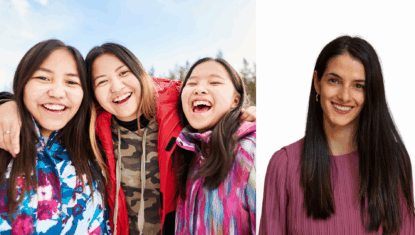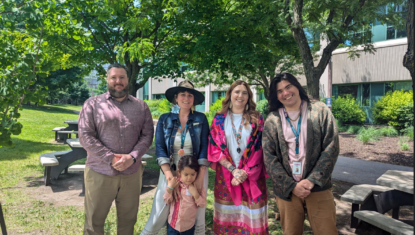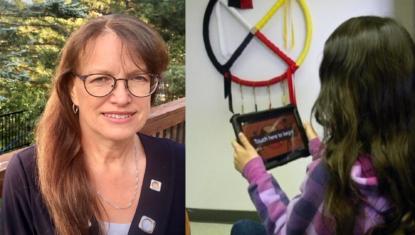Understanding and respecting the cultures of indigenous communities, and the families that make up these communities, is the first step in our research.
Related News
-

30/09/2025
Advancing Indigenous youth mental health research at CHEO
-

23/06/2025
The Aaniish Naa Gegii App Earns National Recognition from the Mental Health Commission of Canada
-

18/03/2024
A self-report health app developed by a team of CHEO researchers helps connect First Nations children and youth to local supports
Research Projects
-
Integrating Worlds: Addressing Noncommunicable Diseases and Mental Health in Indigenous Contexts
22/09/2025
Indigenous youth in Canada face significant and unique challenges related to noncommunicable diseases (NCDs) and mental health, with almost 50% having a diagnosed chronic health condition. These challenges are shaped by historical and ongoing colonialism, which has disrupted cultural and traditional practices and led to intergenerational trauma among some Indigenous Peoples and communities.
-
Engaging Indigenous partners in health service transformation: a framework for sustained engagement built on trust
13/05/2025
This paper examines the development of a national research network called ACCESS Open Minds. This network includes youth, families, clinicians, community members, decision-makers, and academics, all working to transform youth mental health services in Canada. It concludes with a call to build evidence on what works in achieving and maintaining trust in engaging Indigenous partners in health system transformation. Engaging Indigenous partners in health service transformation: A framework for sustained engagement built on trust.
-
First reports of primary ciliary dyskinesia caused by a shared DNAH11 allele in Canadian Inuit
23/04/2023
The discovery of this homozygous DNAH11 variant in widely disparate parts of the Nunangat (Inuit homelands) suggests this is a founder mutation that may be widespread in Inuit. Thus, PCD may be an important cause of chronic lung, sinus, and middle ear disease in this population. Inuit with chronic lung disease, including bronchiectasis or laterality defects, should undergo genetic testing for PCD. Consideration of including PCD genetic analysis in routine newborn screening should be considered in Inuit regions.
-
Impact of a Prenatal Vitamin D Supplementation Program on Vitamin D Deficiency, Rickets and Early Childhood Caries in an Alaska Native Population
22/09/2022
-
Preventing symptomatic vitamin D deficiency and rickets among Indigenous infants and children in Canada
01/05/2022
-
Blending Indigenous Sharing Circle and Western Focus Group Methodologies for the Study of Indigenous Children’s Health: A Systematic Review
12/05/2021
Several groups have published results that describe approaches that successfully incorporated aspects of Indigenous sharing circles into Western focus groups, thus establishing a research method that is culturally safe and appropriate for the study of Indigenous children’s health.
-
Komen sa vo ? Évaluation des besoins de santé et intégration à la culture francophone, anglophone et autochtone chez les enfants métis en milieu minoritaire
02/02/2021
-
Hearing loss prevalence and hearing health among school-aged children in the Canadian Arctic
17/03/2020
One in five school-aged children was found to have hearing loss that is likely to affect classroom learning and social/emotional development. A hearing health strategy tailored to this population is critically needed.
-
Tuberculosis among First Nations, Inuit and Métis children and youth in Canada: Beyond medical management
14/01/2020
Historical TB control practices in Canada have contributed to stigma and discrimination toward those with the disease, as well as fear and mistrust of the health system.
-
Oral aspiration, type 1 laryngeal cleft, and respiratory tract infections in canadian inuit children
01/06/2019
We conclude that swallowing dysfunction is not only prevalent amongst Canadian Inuit but clinically significant. This is the first study to demonstrate an association between swallowing dysfunction and respiratory morbidity in this population.
-
Bronchiectasis in children from Qikiqtani (Baffin) Region, Nunavut, Canada
01/01/2015
Previous researchers have reported that Canadian Inuit children have markedly elevated rates of LRTI early in life. Our study suggests that this may lead to long-term pulmonary sequelae.
-
Long-term respiratory complications of congenital esophageal atresia with or without tracheoesophageal fistula: an update
03/06/2013
Recent studies suggest that in older patients, respiratory symptoms tend to be associated with atopy, but abnormal lung function tends to be associated with gastroesophageal reflux and with chest wall abnormalities.
Researchers
-
David A. Dyment
Scientist, CHEO Research Institute
-
Elizabeth Fitzpatrick
Senior Scientist, CHEO Research Institute
-
Radha Jetty
Investigator, CHEO Research Institute
-
Tom Kovesi
Investigator, CHEO Research Institute
-
Carolyn Melro
Scientist, CHEO Research Institute
-
Leanne Ward
Senior Scientist, CHEO Research Institute
-
Nancy Young
Senior Scientist, CHEO Research Institute







